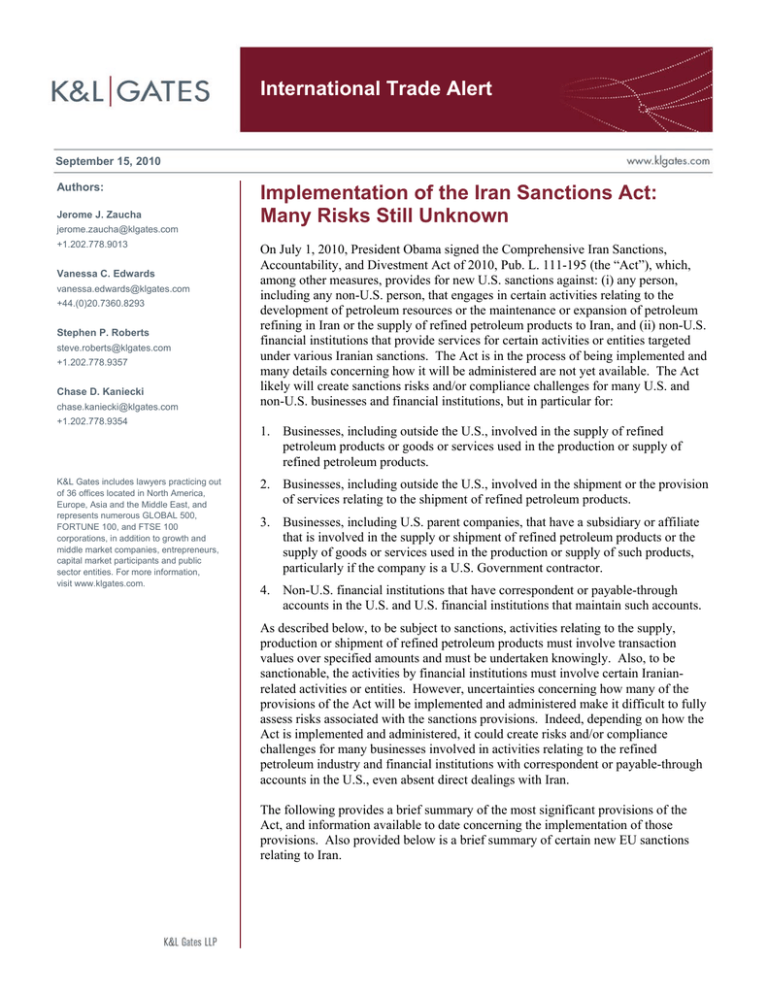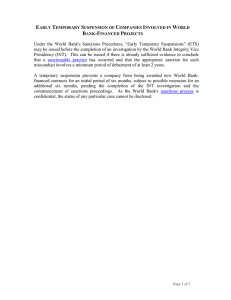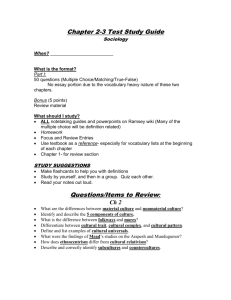International Trade Alert Implementation of the Iran Sanctions Act:
advertisement

International Trade Alert September 15, 2010 Authors: Jerome J. Zaucha jerome.zaucha@klgates.com +1.202.778.9013 Vanessa C. Edwards vanessa.edwards@klgates.com +44.(0)20.7360.8293 Stephen P. Roberts steve.roberts@klgates.com +1.202.778.9357 Chase D. Kaniecki chase.kaniecki@klgates.com Implementation of the Iran Sanctions Act: Many Risks Still Unknown On July 1, 2010, President Obama signed the Comprehensive Iran Sanctions, Accountability, and Divestment Act of 2010, Pub. L. 111-195 (the “Act”), which, among other measures, provides for new U.S. sanctions against: (i) any person, including any non-U.S. person, that engages in certain activities relating to the development of petroleum resources or the maintenance or expansion of petroleum refining in Iran or the supply of refined petroleum products to Iran, and (ii) non-U.S. financial institutions that provide services for certain activities or entities targeted under various Iranian sanctions. The Act is in the process of being implemented and many details concerning how it will be administered are not yet available. The Act likely will create sanctions risks and/or compliance challenges for many U.S. and non-U.S. businesses and financial institutions, but in particular for: +1.202.778.9354 1. Businesses, including outside the U.S., involved in the supply of refined petroleum products or goods or services used in the production or supply of refined petroleum products. K&L Gates includes lawyers practicing out of 36 offices located in North America, Europe, Asia and the Middle East, and represents numerous GLOBAL 500, FORTUNE 100, and FTSE 100 corporations, in addition to growth and middle market companies, entrepreneurs, capital market participants and public sector entities. For more information, visit www.klgates.com. 2. Businesses, including outside the U.S., involved in the shipment or the provision of services relating to the shipment of refined petroleum products. 3. Businesses, including U.S. parent companies, that have a subsidiary or affiliate that is involved in the supply or shipment of refined petroleum products or the supply of goods or services used in the production or supply of such products, particularly if the company is a U.S. Government contractor. 4. Non-U.S. financial institutions that have correspondent or payable-through accounts in the U.S. and U.S. financial institutions that maintain such accounts. As described below, to be subject to sanctions, activities relating to the supply, production or shipment of refined petroleum products must involve transaction values over specified amounts and must be undertaken knowingly. Also, to be sanctionable, the activities by financial institutions must involve certain Iranianrelated activities or entities. However, uncertainties concerning how many of the provisions of the Act will be implemented and administered make it difficult to fully assess risks associated with the sanctions provisions. Indeed, depending on how the Act is implemented and administered, it could create risks and/or compliance challenges for many businesses involved in activities relating to the refined petroleum industry and financial institutions with correspondent or payable-through accounts in the U.S., even absent direct dealings with Iran. The following provides a brief summary of the most significant provisions of the Act, and information available to date concerning the implementation of those provisions. Also provided below is a brief summary of certain new EU sanctions relating to Iran. International Trade Alert Sanctions for Involvement in Activities Relating to Petroleum or Refined Petroleum Products in Iran The Act mandates the imposition of sanctions against any person, including a non-U.S. person, that does any of the following after July 1, 2010: • • • Knowingly makes a single investment of $20 million or, over a 12-month period, a combination of investments of at least $5 million each and totaling at least $20 million in the aggregate that directly and significantly contributes to the enhancement of Iran’s ability to develop petroleum resources; Knowingly “sells, leases or provides to Iran goods, services, technology, information, or support” any of which have a fair market value of $1 million or more or which, during a 12month period, have an aggregate fair market value of $5 million or more “that could directly and significantly facilitate the maintenance or expansion of Iran’s domestic production of refined petroleum products, including any direct and significant assistance with respect to the construction, modernization, or repair of petroleum refineries”; or Knowingly sells or provides to Iran refined petroleum products that have a fair market value of $1 million or more or, during a 12-month period, have an aggregate fair market value of $5 million or more, or sells, leases, or provides to Iran goods, services, technology, information, or support that have a fair market value of $1 million or more or, during a 12-month period, have an aggregate fair market value of $5 million or more that could directly and significantly contribute to the enhancement of Iran’s ability to import refined petroleum products. “Goods, services, technology, information, or support” are described broadly to include underwriting or entering into a contract to provide insurance or reinsurance for the sale, lease, or provision of such goods, services, technology, information, or support, financing or brokering such sale, lease, or provision, or providing ships or shipping services to deliver refined petroleum products to Iran (with a narrow exception for underwriters and insurance providers that can demonstrate the establishment and enforcement of appropriate internal due diligence systems). (emphasis added) We are unaware of any announcements or notices by the Administration to date concerning the implementation of these sanctions provisions. In addition, there has been no indication of when any such announcements or notices may be issued. Two significant elements of the sanctions are that: (i) they may be extended under certain circumstances to parent and affiliate companies, and (ii) prospective U.S. Government contractors will be required to certify that neither the contractor nor any owned or controlled affiliate of the contractor engages in activities that may result in the imposition of sanctions under the Act. 1. Imposition of sanctions on parent and affiliate companies. Under the Act, sanctions can be extended to: (i) a successor to any person determined to engage in activities subject to sanctions, (ii) anyone who owns or controls such a person if they had actual knowledge or should have known the owned or controlled person was engaging in activities subject to sanctions, and (iii) anyone that is owned or controlled by, or under common ownership or control with, a person that “knowingly” engages in activities subject to sanctions. 2. U.S. Government contractor certification requirement. The Act also requires the Federal Acquisition Regulations (FAR) to be revised not later than September 29, 2010 (90 days after the date of enactment) to require a certification from each person that is a prospective government contractor that neither the contractor nor any owned or controlled affiliate of the contractor engages in any activity that may result in the imposition of sanctions. If a contractor submits a false certification, the head of the agency must terminate the contract or suspend such person from eligibility for contracts for a period of up September 15, 2010 2 International Trade Alert to 3 years, in addition to any other remedies for a false certification. We are unaware of any announcements or notices by the Administration further clarifying the standards for extending sanctions to parent or affiliate companies. However, as noted above, regulations implementing the Government contractor certification requirement should be published by September 29, 2010. The Act also provides for three new sanctions (in addition to the existing six sanctions available under the Iran and Libya Sanctions Act of 1996, Pub. L. 104-172) and requires imposition of at least three sanctions in response to a determination that a person is engaging in an activity subject to sanctions. The three new sanctions allow the President to prohibit: • Transactions in a foreign exchange that are subject to the jurisdiction of the U.S. and in which the sanctioned person has any interest; • Transfers of credit or payments between financial institutions or by, through, or to any financial institution to the extent that such transfers or payments are subject to the jurisdiction of the U.S. and involve any interest of the sanctioned person; and • Transactions regarding property or rights to property, including acquiring, selling, importing, exporting, dealing in or exercising any right, power or privilege, or conducting any transaction involving property subject to the jurisdiction of the U.S. and with respect to which the sanctioned person has any interest. Finally, the Act allows for the grant of waivers from the sanctions in certain cases, although the Act suggests the waivers must be granted on a personby-person basis. We are unaware of any announcements or notices having been released, or other details being made available, concerning how the waiver provisions might be implemented. However, the President, in his signing statement on the Act, noted that “it provides new authority for addressing the situation of those countries that are closely cooperating in multilateral efforts to constrain Iran. The Act appropriately provides this special authority to waive the application of petroleum-related sanctions provisions to a person from such a closely cooperating country, out of recognition for the key role such a country plays in ongoing multilateral efforts to constrain Iran.” If the Administration follows the practices currently used in connection with determining and imposing sanctions under certain other sanctions statutes administered by the U.S. Department of State, detailed implementation regulations or guidelines may never be issued. Accordingly, how numerous aspects of the refined petroleum-related sanctions provisions will be implemented remains unclear, including: 1. The extent to which ongoing activities relating to contracts entered into prior to the adoption of the Act or that are not directly with Iran may be subject to sanctions. (Although the Act appears to make clear that most activities subject to sanctions under the pre-existing Iran and Libya Sanctions Act of 1996 that continue after adoption of the new Act will become subject to sanctions under the new Act, the Act also appears to suggest that the other types of activities must have been commenced subsequent to the adoption of the Act to be subject to sanctions.) 2. The exact parameters of the requirement for prospective U.S. Government contractors to certify that the contractor, and any person owned or controlled by the contractor, “does not engage in any activity for which sanctions may be imposed.” (Particularly unclear is the nature of the due diligence that may be required in connection with possible activities by nonU.S. affiliates.) 3. How the phrase “should have known” will be applied in connection with determining whether to extend sanctions to a parent of a person that engages in activities subject to sanctions, on the basis that the parent had actual knowledge of the activities or “should have known” the activities were occurring. (Given the existing prohibition against a U.S. parent company approving or facilitating activities by a nonU.S. affiliate involving Iran, it is particularly unclear how this provision will be applied in the case of a U.S. parent company.) 4. How the various waiver provisions will be applied and, regardless of the requirement September 15, 2010 3 International Trade Alert under the Act that waivers be person-specific, whether the Obama Administration may pursue an approach to waivers that has the effect of granting waivers to categories of persons, including based on country location. Codification of Certain Restrictions Currently or Previously Imposed under the OFAC Iranian Transactions Regulations The Act also mandates the imposition of penalties for the following activities subsequent to September 29, 2010 (90 days after enactment): • Importing goods or services from Iran into the U.S.; and • Exporting goods, services or technology from the U.S. to Iran (exceptions: personal communications; articles to relieve human suffering; information and informational materials; transactions incident to travel; food; medicine; humanitarian assistance; services, hardware, software or technology related to internet communications; goods, services or technology necessary to ensure the safe operation of commercial aircraft; goods, services or technology exported to support international organizations; and exports in the national interest). These restrictions were largely already incorporated into the U.S. Department of Treasury’s Office of Foreign Assets Control’s (“OFAC”) Iranian Transactions Regulations (31 C.F.R. Part 560). Any person violating these prohibitions will face the following sanctions: • If an Iranian entity, available assets will be frozen; and • Other persons will be subject to a civil fine of the greater of $250,000 or twice the amount of the transaction resulting in a violation, and/or a criminal penalty of up to $1 million and up to twenty years in prison. New Restrictions on the Activities of Financial Institutions The Act requires the Department of Treasury to promulgate regulations within 90 days of enactment (September 29, 2010) that proscribe or restrict nonU.S. financial institutions knowingly engaging in the following activities from opening or maintaining a correspondent or payable-through account in the U.S.: • Facilitating the efforts of the Government of Iran (including efforts of Iran’s Revolutionary Guard Corps or any of its agents or affiliates) to: o Acquire or develop weapons of mass destruction or delivery systems for weapons of mass destruction; or o Provide support for terrorist organizations or acts of international terrorism; • Facilitating the activities of a person subject to financial sanctions for violating any U.N.issued Iran sanction; • Engaging in money laundering to carry out an activity described above; • Facilitating efforts by the Central Bank of Iran or any other Iranian financial institution to carry out an activity described above; or • Facilitating a significant transaction or transactions or providing significant financial services for: o Iran’s Revolutionary Guard Corps or any of its agents or affiliates that are subject to sanctions; or o A financial institution subject to sanctions in connection with Iran’s proliferation of weapons of mass destruction and delivery systems for weapons of mass destruction or its support for international terrorism. To ensure compliance with the prohibitions or restrictions, the new regulations will also require U.S. financial institutions to undertake certain due diligence steps in order to maintain a correspondent or a payable-through account for a non-U.S. financial institution, including performing audits, September 15, 2010 4 International Trade Alert providing reports to the U.S. Department of Treasury, and certifying that the non-U.S. financial institution is not knowingly engaged in any of the above activities. The Act also prohibits any person owned or controlled by a domestic financial institution from knowingly engaging in certain Iranian-related transactions, and provides for the imposition of penalties on the parent domestic financial institution if it knew or should have known that the owned or controlled affiliate was violating, attempting or conspiring to violate, or causing violations of the prohibitions. OFAC issued regulations implementing these provisions, the Iranian Financial Services Regulations (31 C.F.R. Part 561), on August 16, 2010. 75 FR 49835-43. Additional Provisions of the Act New Prohibitions on Those Abusing Human Rights President Obama is required to submit to Conress within 90 days after enactment (by September 29, 2010) a list of Iranian government officials, or those acting at their direction, that are in some way responsible for human rights abuses against citizens of Iran or their family members. Those individuals will: (i) be prohibited from entering the U.S., (ii) have their property frozen, and (iii) be subject to new prohibitions on financial transactions and the import-export of property. Government Contracts In addition to the certification requirement for U.S. Government contractors described above, subsequent to 90 days following the adoption of the Act (September 29, 2010), the head of an agency may not enter into or renew a procurement contract with a person that exports “sensitive technology” to Iran, defined as equipment or technology used specifically to restrict the free flow of unbiased information in Iran or disrupt, monitor or otherwise restrict speech of the people of Iran. Certain Divestments Authorized The Act also permits State and local governments to divest from, or prohibit the investment of assets of the State or local government in, a person that: (i) has an investment of $20 million or more in the energy sector of Iran, including in a person that provides oil or liquefied natural gas tankers, or products used to construct or maintain pipelines used to transport oil or liquefied natural gas, for the energy sector of Iran; or (ii) is a financial institution that extends $20 million or more in credit to another person, for 45 days or more, if that person intends to use the credit for investment in the energy sector of Iran. U.N. Security Council Sanctions The Act further increases the penalty for violations of U.N. Security Council sanctions to a maximum fine of $1 million and increases maximum criminal penalties to 20 years in prison. Licenses Required for “Destinations of Diversion Concern” Within 45 days of any report submitted by President Obama identifying a country as a “Destination of Diversion Concern” for products to Iran (that is, it is determined that the country allows substantial diversion of goods, services, or technologies through the country to Iranian end-users or Iranian intermediaries), a license will be required for goods exported to the designated country if that same good is prohibited for export to Iran, with the presumption that any application for such a license will be denied. New EU Iran Sanctions On June 26, 2010, the EU Council imposed new Iran sanctions, expanding sanctions previously adopted in 2007. The 2007 sanctions essentially: • Prohibited exports of nuclear or military goods, technology or related technical assistance to Iran; • Prohibited the entry/transit of persons identified as involved with nuclear activities or weapon delivery systems; • Required Member States to exercise vigilance over the activities of Iranian financial institutions and to inspect cargo to and from September 15, 2010 5 International Trade Alert • Iran if they had grounds for believing sanctions were being breached; and • The opening of new Iranian bank branches, subsidiaries or representative offices in the EU. Froze funds owned or controlled by, and prohibited making funds available to, persons and entities involved with nuclear activities or weapon delivery systems. • Bunkering or ship supply services where there are reasonable grounds to believe that the vessels are breaching sanctions. The 2010 sanctions prohibit: • The export of dual-use goods and technology. • The export of equipment and technology, the use of vessels or aircraft, or the provision of technical or financial assistance, for key sectors of Iran’s oil and national gas industry in Iran, or to Iranian-owned enterprises engaged in those sectors outside Iran. • Investment by Iran or Iranian nationals/entities in any commercial activity in the nuclear sector. • Financing or participating in key sectors of the Iranian oil or gas industry. • Providing insurance and reinsurance to the Government of Iran or Iranian entities or individuals. • Selling, purchasing, brokering or assisting in the issuance of bonds by the Government of Iran or Iranian banks. The 2010 sanctions also require: • Strengthened monitoring of Iranian financial institutions, with new requirements for notification or authorization of certain transfers of funds. • Stronger cargo inspection measures. • Freezing funds of (and prohibiting making funds available to) individuals in the Iranian Revolutionary Guard Corps and Islamic Republic of Iran Shipping Lines. • Provisions applying to Iranian entities normally also apply to persons or entities acting on their behalf or at their direction and to entities owned or controlled by them. If you have any questions regarding the expansion of U.S. and EU sanctions against Iran discussed above, please contact any lawyer in K&L Gates’ International Trade Practice. September 15, 2010 6 For more information on our International Trade practice, please contact one of the lawyers listed below: Beijing Paris Yujing Shu +86.10.8518.8528 yujing.shu@klgates.com Olivia Lê Horovitz +33.1.58.44.15.27 olivia.lehorovitz@klgates.com Berlin Washington, DC Dr. Christian Hullmann +49.30.220.029-140 christian.hullmann@klgates.com Michael J. O’Neil 202.661.6226 mike.oneil@klgates.com Friedrich Ludwig Hausmann +49.(0)30.220029.350 friedrich.hausmann@klgates.com Donald W. Smith 202.778.9079 donald.smith@klgates.com London Jerome J. Zaucha 202.778.9013 jerome.zaucha@klgates.com Robert V. Hadley +44.20.7360.8166 robert.hadley@klgates.com Vanessa C. Edwards +44.20.7360.8293 vanessa.edwards@klgates.com Anchorage Los Angeles San Diego Austin Miami Beijing Berlin Moscow San Francisco Boston Newark Seattle Charlotte New York Shanghai Chicago Dallas Orange County Singapore Dubai Palo Alto Fort Worth Paris Spokane/Coeur d’Alene Frankfurt Pittsburgh Taipei Tokyo Harrisburg Portland Raleigh Hong Kong London Research Triangle Park Warsaw Washington, D.C. K&L Gates is comprised of multiple affiliated entities: a limited liability partnership with the full name K&L Gates LLP qualified in Delaware and maintaining offices throughout the United States, in Berlin and Frankfurt, Germany, in Beijing (K&L Gates LLP Beijing Representative Office), in Dubai, U.A.E., in Shanghai (K&L Gates LLP Shanghai Representative Office), in Tokyo, and in Singapore; a limited liability partnership (also named K&L Gates LLP) incorporated in England and maintaining offices in London and Paris; a Taiwan general partnership (K&L Gates) maintaining an office in Taipei; a Hong Kong general partnership (K&L Gates, Solicitors) maintaining an office in Hong Kong; a Polish limited partnership (K&L Gates Jamka sp.k.) maintaining an office in Warsaw; and a Delaware limited liability company (K&L Gates Holdings, LLC) maintaining an office in Moscow. K&L Gates maintains appropriate registrations in the jurisdictions in which its offices are located. A list of the partners or members in each entity is available for inspection at any K&L Gates office. This publication is for informational purposes and does not contain or convey legal advice. The information herein should not be used or relied upon in regard to any particular facts or circumstances without first consulting a lawyer. ©2010 K&L Gates LLP. All Rights Reserved. 100322_3897 K&L Gates includes lawyers practicing out of 36 offices located in North America, Europe, Asia and the Middle East, and represents numerous GLOBAL 500, FORTUNE 100, and FTSE 100 corporations, in addition to growth and middle market companies, entrepreneurs, capital market participants and public sector entities. For more information, visit www.klgates.com.





